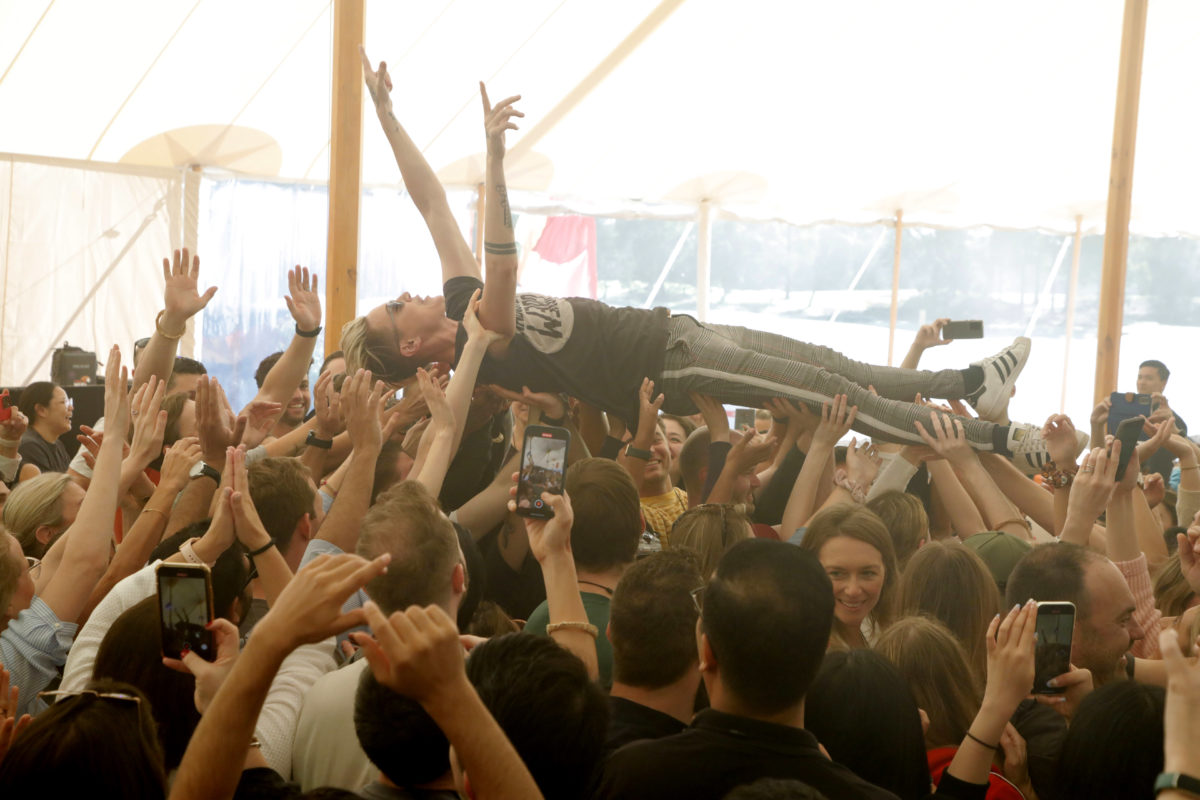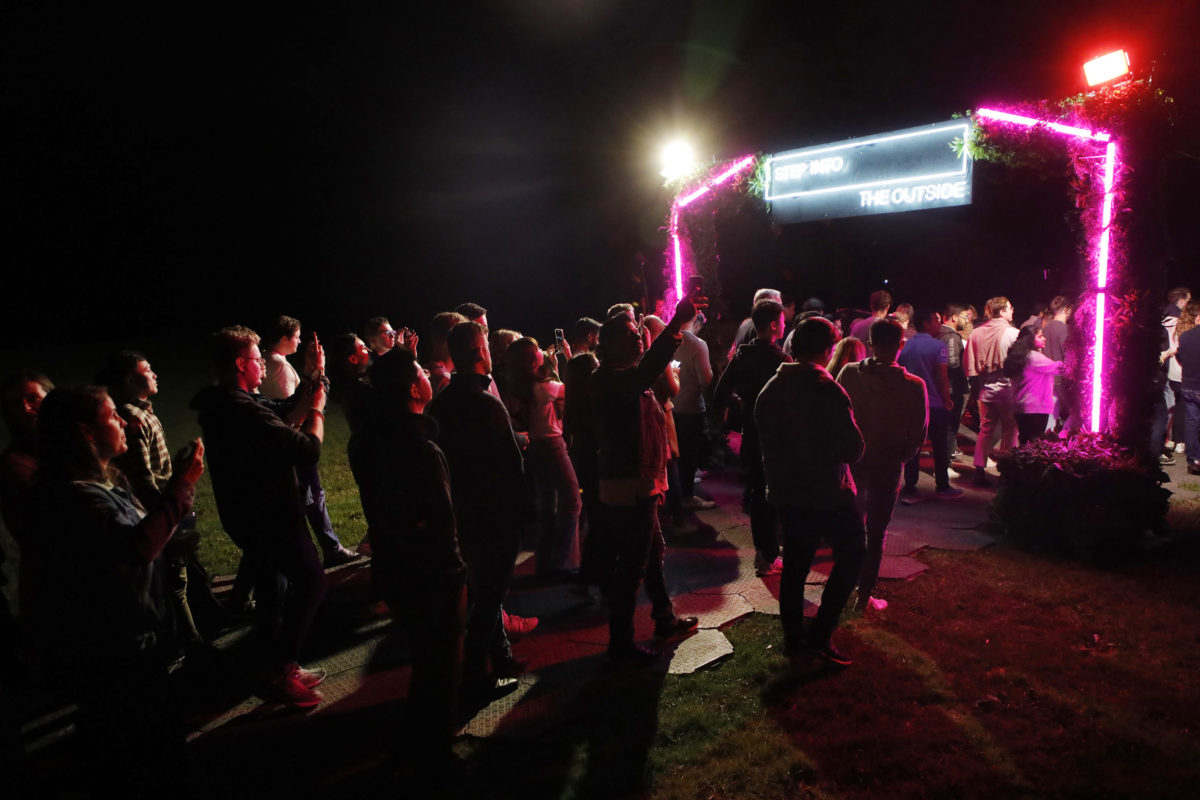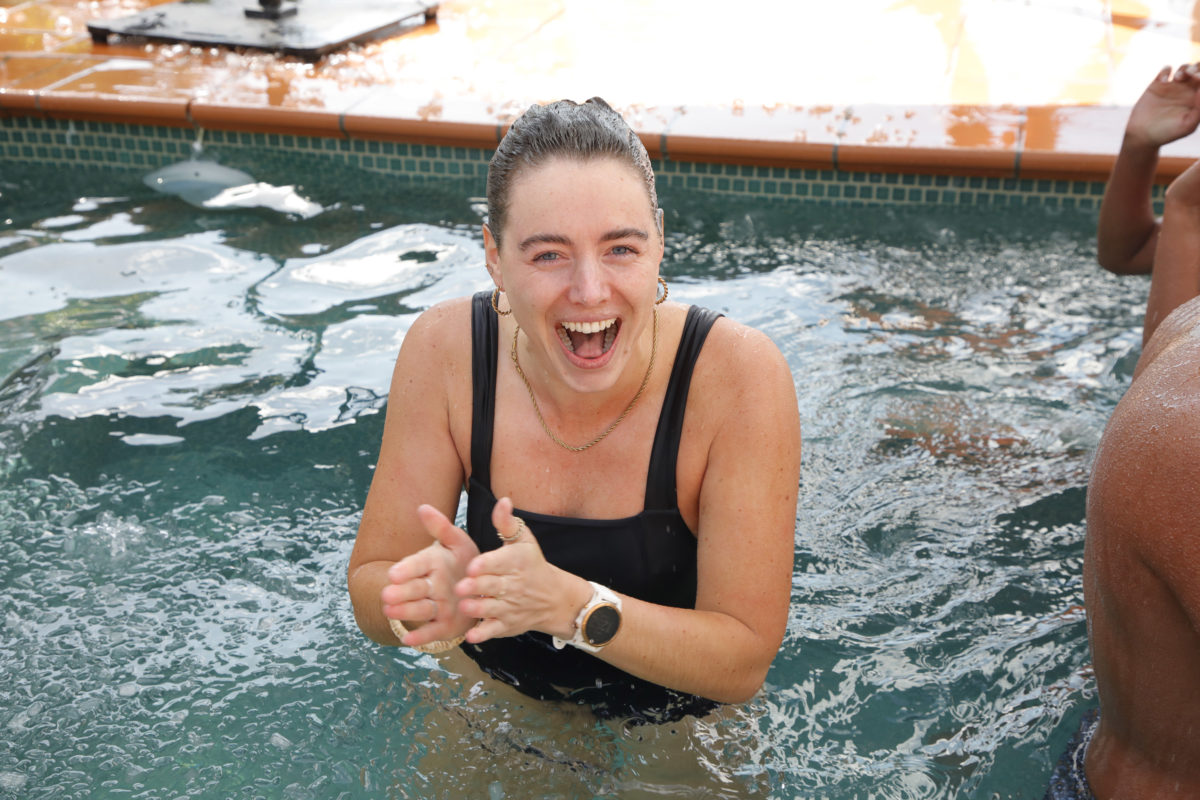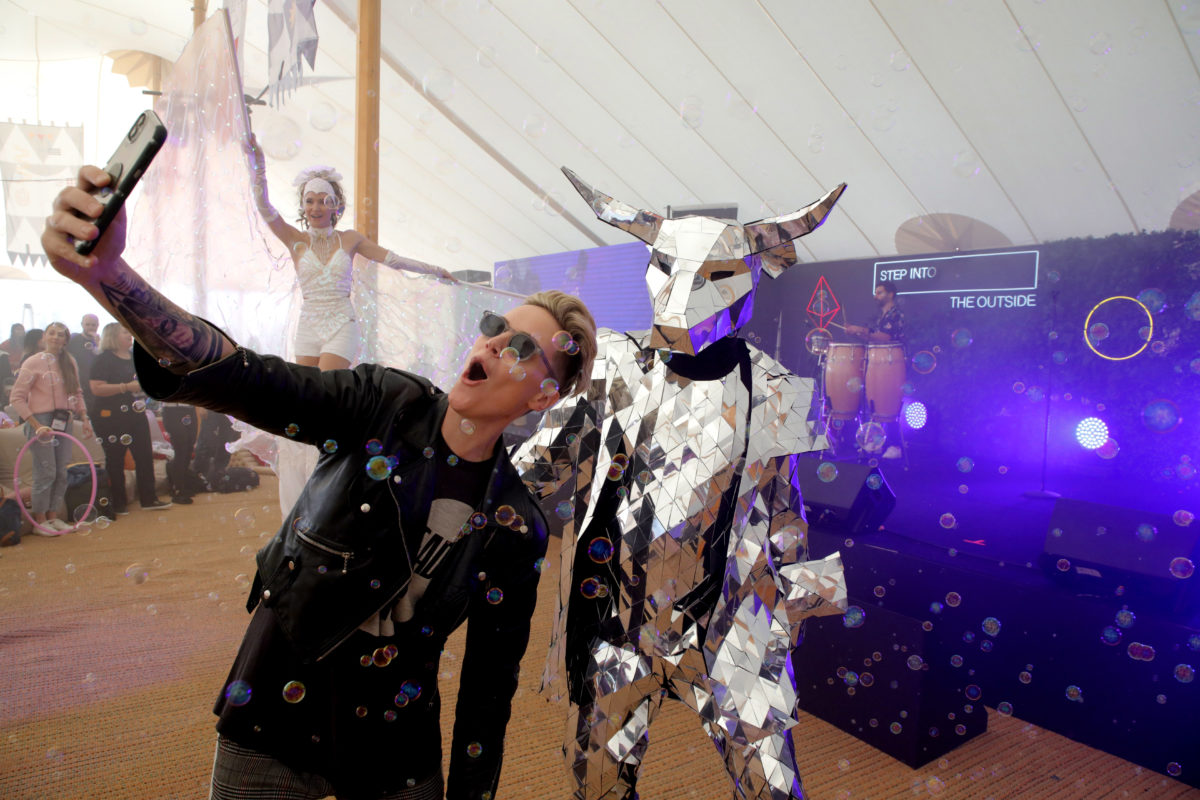From dunking yourself into an ice-bath to getting in touch with your inner child – PwC’s ‘The Outside’ event could change the game for professional development programs of the future.
It’s not my regular Monday morning at work. I’m walking through a field of teepees, housing hay bales and bean bags, towards an even larger tent packed with around 500 PwC senior associates and managers.
From across the field, I can hear a live rendition of ‘Valerie’ by Amy Winehouse spilling out of the tent. As I get closer, I can see people bobbing and swaying in the crowd as the lead singer of a cover band revs the audience up (I’m told, in the days prior, this led to some early morning crowd surfing).
It’s 8:30am; my coffee hasn’t even kicked in, yet there are people in the crowd audibly woo-hooing and showing off their best dance moves… in front of their colleagues – many of whom they’ve never met before.
This, I realise in retrospect, isn’t anywhere near close to the most vulnerable thing these people will do that day. In fact, it’s almost mundane in the grand scheme.
These were my first five minutes at week five of PwC’s ‘The Outside’ event.

Over May, each week between 500-600 mid-level employees (the company’s future leaders) from across Australia gathered on the land of the Wonnarua people for a four-day immersive event in NSW’s Hunter Valley.
Results from PwC’s company wide engagement survey sent a clear message: its millennial cohort wanted more recognition, reward and learning opportunities. This isn’t exclusive to PwC. Deloitte’s latest millennial and Gen Z survey found learning and development was amongst the top retention points for young workers, alongside better mental health and wellness support.
So, in a bid to retain and recognise these workers – and perhaps attract a few star players along the way – PwC delivered not a conference, but an experience that employees are unlikely to forget.
Immersing in country, self and community
The majority of attendees (86 per cent) were millennials, which PwC’s Future of Work Lead Partner, Lawrence Goldstone, sees as a critical employee group for businesses to invest in right now.
“We have the broadest set of diversity in our business at these younger levels. They expect, need and want a different experience,” says Goldstone, who was one of the driving forces behind the event.
Large-scale professional development events like this are often the purview of senior leaders, he says. Companies invest in turning people into a stronger leader, but they’ve spent the last few decades cementing their approach and, often, mindset.
“The opportunity here was to flip that and ask, ‘What if we invested that level of capability, expertise and insight to fuel curiosity in 3000 future leaders? Otherwise it becomes too late and people are saying, ‘I wish I knew this 20 years earlier.'”
“If we don’t tip the learning model on its head to create curiosity and to integrate life-long learners… then we’re missing the point.” – Lawrence Goldstone, FoW Lead Parter, PwC
So other than teepee dwelling and hot cacao sipping, what did this investment actually look like?
The whole event was designed with “radical inclusivity” in mind, says Goldstone. Participants were able to choose their own adventure and growth opportunities, and there was a wide range of speakers from diverse backgrounds, including a significant portion of First Nation speakers.
The event was designed to build upon itself, taking place over four days and it was “brand agnostic”, meaning there were no PwC Partners leading sessions or pushing the firm’s agenda or objectives. Each day would kick off with keynote presentations followed by a range of immersion sessions designed to cater to a broad array of interests and needs.
Day one was all about connection to Country. Participants arrived on a Sunday afternoon and were given the opportunity to witness a detailed welcome to country procession, which included a smoking ceremony, traditional dance, and an invitation to make connection to the Wonnarua land via an ochre ritual, planting people’s hand prints upon the trees.

That night, journalist Stan Grant and Paralympian Kurt Fearnley graced the main tent, delivering keynotes about reconciliation and resilience, respectively. While it was the focus of day one, Indigenous stories and practices were a central theme of the entire event.
Day two focused on ‘self’. People engaged in activities designed to teach them about areas of their personal life that they might like to improve, such as their sleep, gut health, resilience or nutrition, or to tap into their inner five-year-old (which was one of the most popular sessions).
“Everyone was really vulnerable from the get-go… we were able to connect [with each other] immediately,” says Maddy Bartlett, Marketing Executive at PwC. “Sometimes at work you hold up a barrier, but once we worked through that, we quickly understood that people have a lot more layers than what we’re used to. It taught us that there’s more to people than what you just see at work.”
It was this day that another one of the most popular sessions was held: an intensive breath-work workshop that ended with groups dunking themselves into a pool that had been filled with ice (yes, in the middle of May…).
Day three was future focussed. Speakers included Kirk Docker (the creator of the ABC’s You Can’t Ask That), Atlassian Futurist Dom Price, Futurist Dr Catherine Ball and many more big names. Powered by the Australian Film Television and Radio School (AFTRS), a large portion of the day was dedicated to creative storytelling and building connection, while a range of other experts facilitated immersions around performing under pressure, engaging in more effective communication and how to rethink your digital input.

It’s the final day, which is focused on community, when things were really shaken up. There were no keynote speakers lined up or sessions booked in – everything was run by the participants themselves. They called it an ‘unconference’.
In the three days leading up to this, participants can write up session titles on a communal board, based on their own expertise and interests, and others can choose which peer-led session they want to attend.
“One I went to was hosted by a colleague from the LGBTQIA+ community and it was an ‘ask me anything’ session,” says Bartlett. “We got to literally ask anything. And because it was on day three, when everyone had had the opportunity to be comfortable and to be vulnerable, we were really digging deep.
“[For example], we asked about the appropriate way to talk about someone’s pronouns. It was absolutely a fantastic session,” she says.
Goldstone adds: “Some people held conversations around the future of design, the future of wellbeing, or the future of AI. Last week there were some great ones on learning from working mums about balancing careers and walking a mile in [someone’s] shoes as an immigrant. This is giving voice to things we never really talk about at work.”
Is this the next evolution of professional development?
Each day was book-ended with a fitness/mindfulness activity in the morning and an entertainment session in the evening – think dance parties, food vans and performances.
For this reason, some attendees – or explorers, as PwC call them – playfully referred to the event as ‘corpchella’ (corporate coachella), and while Goldstone can recognise the importance of fore-fronting the fun and playful elements that such a name evokes, he’s quick to clarify that it’s so much more than that.
“That’s just the wrapper. This is a different experience of learning. If we don’t tip the learning model on its head to create curiosity and to integrate life-long learners then we’re missing the point. We’ve been stuck in the old model for so long.
“If you look at the skills for the future, eight out of the 10 World Economic Forum skills of the future are what some people call ‘soft skills’. They’re human skills, there’s nothing soft about them. They’re the hardest skills in the world to curate. I think we’ve over indexed, rightly, in technical and digital skills as our mainstream training. And that’s not what this is.”
Organisations such as PwC are great at investing in technical training, says Goldstone, adding that it’s still important to focus on those traditional training approaches to build business acumen and skills.
“But the other half of that is human skills. That’s about belonging, culture, resilience, creativity and curiosity; they’re the ones that are going to help us be better leaders in the future.

“The opportunity to ground [employees] to be more aware, more curious, more conscious of the world around them and to be able to have a voice in that, for me, is how we’re going to get change.”
I’ll be upfront here: this event might not be everyone’s cup of tea, and Goldstone and his co-creators are aware of that. The opt-in sound baths, sessions to meet your inner child and ice plunges might raise some eyebrows, but even if that’s not your vibe, there’s still so much to like about what PwC is doing.
Rather than have its people sit in a day-long webinar or attend ad-hoc wellbeing sessions (if they can squeeze it into their lunch break, that is), it gave people permission to switch off entirely from work for a whole four days – work emails and calls were asked to be placed on hold – and in the age of hyper productivity, that’s a huge luxury.
“Our [work] teams were split up across different weeks, so no one went at the same time, which meant everyone could still manage their workload,” says Bartlett. “And we were assured that there was cover happening back at work. This meant you could really switch off. I didn’t bring my laptop; I didn’t think about work once. I truly immersed myself in the experience, which I was so grateful for.”
Our personal and professional lives have never been as entangled as they are now. If employers want their people to be resilient, agile and open-minded, perhaps they have an obligation to help them get there. And maybe it looks something like The Outside.
“We have plenty of online learning, plenty of task-based learning, plenty of red brick universities giving out credentials, and there’s a place for that,” says Goldstone. “This is just different. This does not replace any of our functional learning. This is a reward and recognition program and it’s a radical investment in our people.”
How can you revolutionise your professional development?
Okay, now I’m going to try and read your mind… are you thinking, “This sounds all well and good for PwC, but what about those of us without a multi-million budget to inject into professional development?”
That’s what I was thinking too. It’s true that PwC certainly has the financial means to create an experience like this on such a grand scale. However, I do think there are some takeaways which can be applied on a smaller scale.
-
- Think about the whole person – This was probably my biggest take away from my visit to The Outside. Professional development that starts and stops with the business’s objectives – e.g. “We want to scale the business, so we need you to learn how to work faster” – is unlikely to result in long-term gains (or short-term ones for that matter).
The modern way in which we work requires a deeper look into the essence of your employees: what makes them tick? Where are their development opportunities? What challenges them? What lights them up? And, most importantly, what is an employer’s role in helping someone to be at their best?This is what I think PwC has done really well. Participants could choose to embrace a session designed to help them to be more courageous or to sleep better, or they could rummage through the snacks tent and chill out in the sun. There was no right or wrong way to participate. - Give people time – Not everyone can invest money, but it’s more likely that some businesses can invest time. And as HRM has explored before, that can have remarkable impacts on people’s wellbeing.
Try giving employees a whole day to unplug and put their work matters on hold. As Goldstone notes, not only do you need to make space for the learnings to occur, you also need to factor in the incubation time. You don’t want your people leaving a one-hour presentation feeling inspired only to forget the details a few days later. - Host an unconference – While Bartlett says the quality of the keynote speakers was amazing, it’s unlikely that a small business has the funds to engage someone like Stan Grant to inspire and educate people. So why not host your own unconference? Open the floor up to your own people’s expertise and give them the opportunities to tell their stories. You never know, you just might find you have a cauliflower connoisseur in your midst.
- Be curious and push boundaries – What would it mean to teach employees how to demonstrate vulnerability? What do people gain from learning more about the Indigenous land upon which they work? How can you help someone to think differently?”There’s so much content out there,” says Goldstone. “Find opportunities to create discussion.”
- Think about the whole person – This was probably my biggest take away from my visit to The Outside. Professional development that starts and stops with the business’s objectives – e.g. “We want to scale the business, so we need you to learn how to work faster” – is unlikely to result in long-term gains (or short-term ones for that matter).
Help people to find an interest in a topic they didn’t even know they cared about, he adds.
“Social media has [forced] us into singular trains of thought. Find the opportunity to think broader. Play outside of your field, however you can.”
Images: Supplied.


I had a higher opinion of PwC before reading this. This is not radical or new. We did all this Woo-Hoo training in the 80’s. It was embarrassing. I’m so sorry to see it returning. I thought it had been rightly abandoned. It was also inappropriate and misguided. I’m just wondering how many people felt free to decline the invitation? How many attend this event and pretend to participate in the belief that this is what the company demands? Who were the brave souls who spoke up about this kind of training and indoctrination? I’d put a crown on those… Read more »
Cheryl, my sentiments exactly. This is not new. In fact the walking on hot coals, parachuting caused more stress and pressure. Full circle.
This is the opposite of ‘radical inclusivity’ and quite frankly a bit cringe to read. If ‘talking about how to ask someone about their pronouns’ is the height of vulnerability, there is a problem.
The negativity in the comments above reflect what’s challenging for new generations entering the workforce and breeds toxic workplace cultures. Saying something ‘isn’t new’ because it happened in the 80s is so out of touch. The targeted audience were likely not even born, let alone in the workplace in the 80s, and are unlikely to have experienced anything like this. Decades of reduced learning and development budgets have resulted in lack-lustre experiences and online learning for most. I for one would love the opportunity to connect with peers and colleagues like this. And definitely something to think about in planning… Read more »